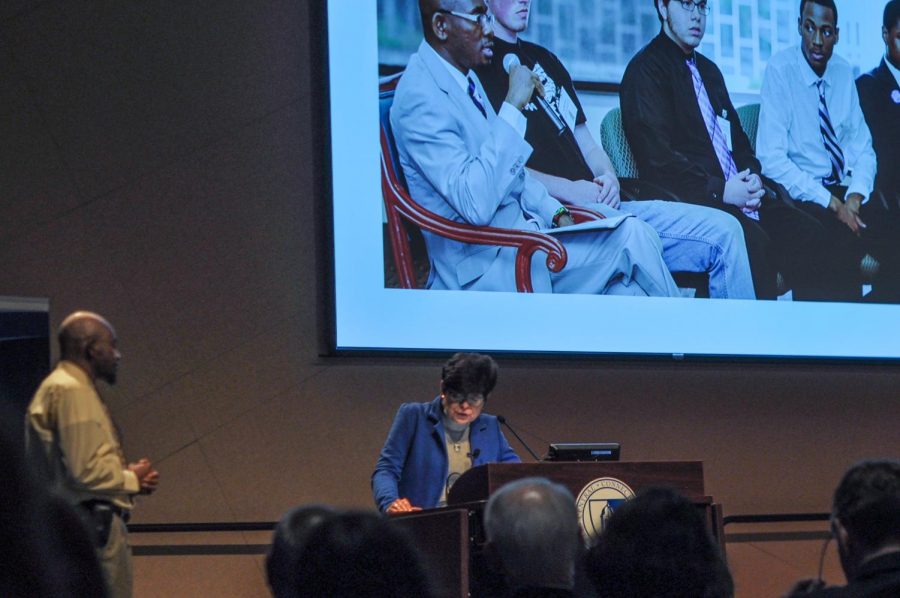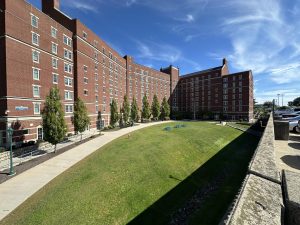Enrollment A Main Focus During President Dr. Zulma Toro’s Annual Opening Meeting
September 23, 2019
President Dr. Zulma Toro’s annual opening meeting debuted with some unpleasant news for the 2019 – 2020 academic year. During the speech, Dr. Toro addressed the low-enrollment of the Fall 2019 semester and it’s heavy influence on several aspects of the university, such as student retention, campus projects and creative solutions.
Dr. Toro immediately dove into enrollment statistics which are “low in every category.”
The total full and part-time enrollment is just over 9,000 and the graduate school’s students barely reach over 2,000; the school’s combined number of students is 11,154, becoming the lowest enrollment since 1978, according to Dr.Toro.
She highlighted that the main problem being only 72 percent of first-year students returned for a second year.
“We have quite a climb ahead of us,” Dr. Toro admitted, however she also believed there was good news with the past year.
Compared to the 2013 retention rate of first-year full-time students, which was 80 percent, the increase in the 4 and 6-year graduation rates appears to be moving up, thus demonstrating that the school can achieve higher rates when the retention rate reaches this percentage.
In fact, she set the strategic goal for the first- year’s retention to 85 percent.
“Our minority enrollment continues to edge off,” Dr. Toro continued, “38 percent of our first-year full-time class are students of color, and overall, the number is 35 percent.”
She added if the school can grow the full-time Hispanic number from 20 percent to 25 percent, it can earn the designation of a Hispanic-serving institution and the right to apply for significant federal Title III and Title V grants.
Moving forward, Central will continue to invest and support certain areas such as enrollment management and strategic academic innovation that will help them cultivate enrollment and make the campus more inclusive.
“I think that we can all do the math, fewer students meant a reduction in revenue,” Dr. Toro said. “We need to reduce spending by 1.4 million dollars, but we are not making across the board cuts.”
“It is clear we cannot continue to operate in the same manner that we did five or even two years ago,” Dr. Toro said. “The landscape is changing. We are dealing with a generation of students whose expectations and needs are significantly different.”
When it comes to enrollment, launching a more aggressive campaign to reduce out-of-state tuition for all New England students was stated. Retention will involve implementing a “First-Year Connect” which involves volunteers connecting with first-year students.
Dr. Toro described “First-Year Connect” as a one-year grant, up to $10,000, as well as another approach- the creation of the Circle of Care Initiative to provide students with basic needs that they can not obtain on their own.
The new programs include a drop off child care center on the edge of campus starting in January.
“The School of Education and Professional Studies will run the center and, in doing so, will create new internships and clinical and work-study opportunities for our students,” Toro added.
New developments have been arising to implement change and opportunities, including a new esports curriculum developing grant and a graduate-level certificate in business leadership. Along with that, the department of geography is working to establish an undergraduate certificate, construction management is developing a doctoral program and the establishment of pathways between community colleges and centers is emerging.
In June, Central Connecticut, signed an articulation agreement with Manchester Community College to provide a smooth transition for students who wish to pursue Tourism and Hospitality Studies.
Also, the School of Business is expanding to Tunxis Community College and allowing students who earn business degrees there to complete a Bachelor of Science in management and organization from Central Connecticut. This will take action in Fall 2020.
Dr. Toro calls one of the most important things to keep Central students returning is to lend comfort and support to our Central family.
“We must use and enforce an inclusive and safe campus where everyone is valued and can participate in a free and respectful exchange of ideas,” Dr. Toro stated.
“We have the capacity for establishing a new model of higher education for the 21st century,” Dr. Toro continued. “We are a public institution committed to its responsibilities as a drive new force and enabler of social mobility and a committed community partner.”
“After all, we are all part of the same family. After all, we are the central family,” she finished.




